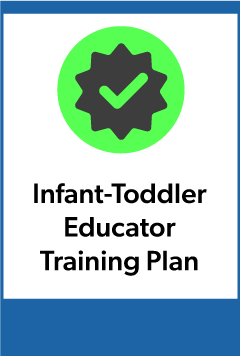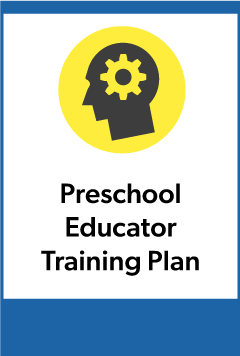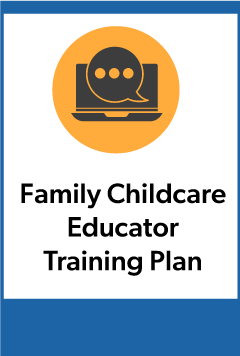Online Training Resources

TRAINING PLANS
Kickstart your professional learning with our streamlined competency-based learning plans, designed to sequence online resources for effective classroom practice. These plans help you learn and practice the competencies needed to earn the Early Childhood Educator credential.
- Curated Resources: Access high-quality online materials aligned with essential teaching skills and strategies.
- Self-Paced Learning: Easily fit the learning plans into your schedule with flexible, self-paced modules.
- Earn Certificates: Receive certificates for clock hours and Continuing Professional Education (CPE) credits.
EXPLORE MORE TRAINING RESOURCES
SEARCH BY KEYWORD
SEARCH BY SUB AREA
FILTER BY AGE RANGE
2022 Texas Prekindergarten Guidelines Domain 1: Social and Emotional Development
This is a training on Domain 1: Social and Emotional Development in the 2022 Texas Prekindergarten Guidelines. The course provides prekindergarten teachers with an introduction to the Social and Emotional Development domain, end-of-year outcomes, and instructional strategies to support children’s skill development.
2022 Texas Prekindergarten Guidelines Domain 9: Physical Development
This is a training on Domain 9: Physical Development in the 2022 Texas Prekindergarten Guidelines. The course provides prekindergarten teachers with an introduction to the Physical Development domain, end-of-year outcomes, and instructional strategies to support children’s skill development.
Beginning Education: Early Childcare at Home (English) Module 1-2
The Beginning Education: Early Childcare At Home program is a professional development program specifically designed for home-based child care providers of children from birth to five years.
Beginning Education: Early Childcare at Home Module 3
The Beginning Education: Early Childcare At Home program is a professional development program specifically designed for home-based child care providers of children from birth to five years.
Beginning Education: Early Childcare at Home Module 4
The Beginning Education: Early Childcare At Home program is a professional development program specifically designed for home-based child care providers of children from birth to five years.
CIRCLE Infant & Toddler Teacher Training: “Connect with Me” Series Part 1-2
Connect with Me is a five-part series of courses that introduces ways teachers of infants and toddlers can support children’s social and emotional development by expressing warmth, comforting children in distress, labeling feelings, engaging in back-and-forth play, and using praise.
CIRCLE Infant & Toddler Teacher Training: “Connect with Me” Series Part 3-5
Connect with Me is a five-part series of courses that introduces ways teachers of infants and toddlers can support children’s social and emotional development by expressing warmth, comforting children in distress, labeling feelings, engaging in back-and-forth play, and using praise.
CIRCLE Infant & Toddler Teacher Training: “Talk with Me” Series Part 1-2
Talk with Me is a three-part series of courses that introduces ways teachers of infants and toddlers can support language development by using descriptive communication, modeling language, listening, and engaging in conversations.
CIRCLE Infant & Toddler Teacher Training: “Talk with Me” Series Part 3
Talk with Me is a three-part series of courses that introduces ways teachers of infants and toddlers can support language development by using descriptive communication, modeling language, listening, and engaging in conversations.
Core Competency Area 1: Child Growth and Development
In this course series you will learn about the professional competencies found in the Texas Core Competencies for Early Childhood Practitioners and Administrators, developed by the Texas Head Start State Collaboration Office (THSSCO), in collaboration with the Texas Early Learning Council (TELC). The content and structure of the competencies can be thought of as a framework for assessing knowledge and skills, guiding training and professional development opportunities, and monitoring progress. This version of the training was designed for use by early childhood practitioners.
Core Competency Area 2: Responsive Interactions and Guidance
In this course series, you will learn about the professional competencies found in the Texas Core Competencies for Early Childhood Practitioners. The content and structure of the competencies can be thought of as a framework for assessing knowledge and skills, guiding training and professional development opportunities, and monitoring progress. This version of the training was designed for use by early childhood practitioners.
Core Competency Area 3: Learning Environments, Planning Framework, Curriculum, and Standards
In this course series, you will learn about the professional competencies found in the Texas Core Competencies for Early Childhood Practitioners. The content and structure of the competencies can be thought of as a framework for assessing knowledge and skills, guiding training and professional development opportunities, and monitoring progress. This version of the training was designed for use by early childhood practitioners.
Core Competency Area 4: Supporting Skill Development
In this course series, you will learn about the professional competencies found in the Texas Core Competencies for Early Childhood Practitioners. The content and structure of the competencies can be thought of as a framework for assessing knowledge and skills, guiding training and professional development opportunities, and monitoring progress. This version of the training was designed for use by early childhood practitioners.
eCIRCLE Professional Development Series: Setting the Stage for Children’s Talk
Setting the Stage for Children’s Talk introduces ways teachers of pre-K children can extend children’s language through responsiveness, descriptive communication, scaffolding and modeling, and engaging in convsersations, to support children’s language development.
eCIRCLE Professional Development Series: Building Vocabulary
This training focuses on developing and enhancing theme-based vocabulary instruction for pre-kindergarten children.
eCIRCLE Professional Development Series: Early Childhood Mathematics
This training presents strategies and rationale for supporting mathematics development in early childhood classrooms.
eCIRCLE Professional Development Series: English Language Learners: Culture, Language, Instruction
English Language Learners: Culture, Language, Instruction introduces ways teachers of pre-K children who are English language learners can consider linguistic and cultural individuality and extend children’s language through responsive, descriptive communication, scaffolding and modeling, and engaging in conversations, to support children’s language development.
eCIRCLE Professional Development Series: Read Aloud
This training focuses on planning and leading effective read alouds. It includes research-based techniques for extending the benefits of read alouds throughout the day and week and presents read alouds as a cornerstone of children’s literacy.
eCIRCLE Professional Development Series: Social and Emotional Learning
Social Emotional Learning introduces ways teachers of pre-K children can express warmth, comfort children in distress, label feelings, engage in back and forth play and use praise to support children’s development of self-concept, self-control, social competence, and social awareness.
Texas ITELG Module 1 – Orientation
This course is a self paced training that helps caregivers understand the developmental domains, instructional and responsive care giving strategies for children from birth to 3 years old.
Texas ITELG Module 2 – Early Physical Health & Motor Development
This training helps caregivers understand the physical, health and motor development, instructional and caregiving strategies for children from birth to 3 years old.


